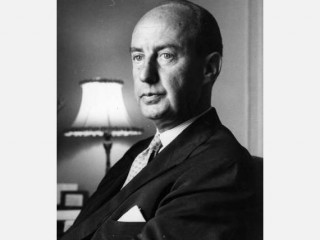
Adlai Stevenson biography
Date of birth : 1900-02-05
Date of death : 1965-07-14
Birthplace : Los Angeles, California
Nationality : American
Category : Politics
Last modified : 2010-11-08
Credited as : Politician and diplomat, statesman,
Adlai Ewing Stevenson, American statesman and diplomat, was twice Democratic candidate for president.
Adlai Stevenson was born in Los Angeles, Calif., on Feb. 5, 1900, of a family prominent in Bloomington, Ill. He was the grandson of Adlai E. Stevenson, the vice president under Grover Cleveland. Graduating from the public schools, he attended Choate Academy, an eastern private school. He finished Princeton University in 1922 and graduated from Northwestern University Law School in 1926. Admitted that year to the Illinois bar, he began law practice in Chicago. He early showed studious tastes, especially for history and international affairs.
Stevenson became familiar with farm needs and policies around Bloomington. He combined intense faith in democracy with a strong desire to encourage thinking upon the issues of the time. His principles were also influenced by work in Franklin Roosevelt's New Deal administration. He worked for the Chicago Foreign Policy Association and the Chicago Bar Association and helped to promote the civil rights movement. In 1946-1947 he served as United States delegate to the General Assembly of the United Nations.
In 1948 Stevenson was elected governor of Illinois. His administration of the state, though ambitious and vigorous, was hampered by Republican legislative opposition and a division of sentiment between rural and industrial Illinois. Nevertheless, having attracted wide attention through speeches and articles, he was nominated for president on the Democratic ticket in 1952. Though defeated by Dwight Eisenhower, he maintained his place as leader of the Democratic party, representing its more studious, liberal element.
Stevenson ran against Eisenhower again in the presidential race of 1956. A lonely, thoughtful man, with a tinge of melancholia which made him seem unhappy despite his warm humor and flashing wit, he appeared colorless compared with Eisenhower. He later declared that one of his principal disappointments in 1956 was the failure to provoke a real debate on the issues. Stevenson's contribution to public discussion was, nevertheless, large and unique, for he appraised the importance of issues in the revolutionary new era.
After John F. Kennedy was elected president, Stevenson made no secret of his wish to be appointed secretary of state. Made ambassador to the United Nations instead, he was deeply disappointed. He felt humiliated when, as America's UN representative, he had to explain and defend policies and actions of other men, some of which, like the Bay of Pigs invasion in Cuba in April 1961, he did not approve. But he was an immovable supporter of the United States against Soviet policies and threats and especially distinguished himself in refuting and denouncing the U.S.S.R.'s position in UN debate. On Oct. 25, 1962 he demanded that the Soviet ambassador to the UN state honestly whether the U.S.S.R. was placing missiles and sites in Cuba. When Soviet Ambassador Zorin replied evasively, "I am not in an American courtroom, sir," Stevenson thundered, "You are in the court of world opinion right now." While still ambassador to the United Nations, Stevenson died suddenly in London on July 14, 1965.
Bert Cochran, Adlai Stevenson: Patrician among the Politicians (1969), views Stevenson as a member of an American ruling upper class. Other biographical works include Kenneth Sydney Davis, The Politics of Honor: A Biography of Adlai E. Stevenson (1957; rev. ed. 1967); Stuart Gerry Brown, Conscience in Politics: Adlai Stevenson in the 1950's (1961) and Adlai E. Stevenson, a Short Biography: The Conscience of the Country (1965); Herbert J. Muller, Adlai Stevenson: A Study in Values (1967); and Richard J. Walton, The Remnants of Power: The Tragic Last Years of Adlai Stevenson (1968). Composite views of Stevenson are offered by Alden Whitman and the New York Times as Portrait: Adlai E. Stevenson: Politician, Diplomat, Friend (1965), and Edward P. Doyle, As We Knew Adlai: The Stevenson Story by Twenty-two Friends (1966). Also useful is Rockefeller Brothers Fund, Prospect for America: The Rockefeller Panel Reports (1961).
















